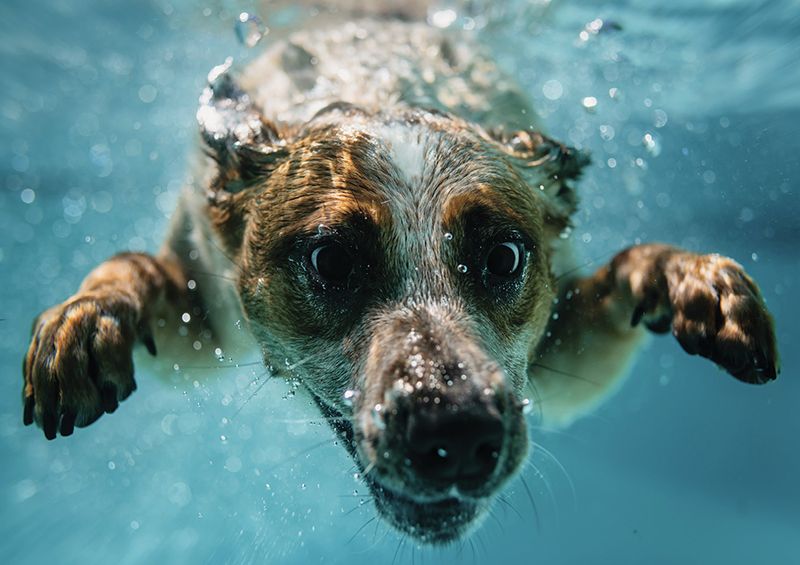While bemoaning the loss of this year’s DockDogs event, one Charlestonian amuses herself with memories of canines past with decidedly different swimming abilities

For many folks, a highlight of February in Charleston is the Southeastern Wildlife Exposition (SEWE), the long-running extravaganza that celebrates wildlife and nature via art exhibits, conservation education, sporting demos, and—most importantly, in my opinion—DockDogs competitions.
When I learned that SEWE was being postponed this year, I was relieved (I can’t get the COVID vaccine soon enough), but that didn’t stop me from briefly mourning the loss of the DockDogs event. I love admiring the skill and agility of the contestants as—head up, ears back, legs and tail outstretched—they leap majestically from a 40-foot dock into a large pool. Each dog is judged on the height and length of the jump and, once in the water, on its swimming speed.
Though now open to all breeds, the competition originated with the usual “water dogs.” As a native of the Lowcountry, where there’s more water than solid ground, I grew up with many such canines: goldens and Labradors, as well as hardy, handy Boykin spaniels. I imagine many of them could have relied on their natural instincts alone to score well in the DockDogs competition. But others I know? Well, reminiscing about them helped me laugh my way out of another case of the pandemic doldrums.
For starters, I don’t think the judges would have been impressed with the disobedience of Bean, the golden retriever. He regularly sneaked through the front gate at my sister’s house on Anson Street and adroitly negotiated the traffic at Calhoun and Meeting to loll in his favorite dog spa: the fountain at Marion Square. This brought continual delight to tourists and eventually elevated Bean to celebrity status when a photo of him in the fountain made the newspaper.
At the other end of the spectrum was Argus, my sister’s collie whose coat was as camera-worthy as Lassie’s. Argie’s first introduction to water was the lake at a friend’s country place. Still a puppy, he followed his family onto the dock and promptly tumbled right in. “Not to worry,” my brother-in-law said calmly, soothing his children, who were scared Argie would drown. “Dogs swim naturally. He’ll get back to shore.”
Except Argie could be seen through the clear water standing motionless at the bottom of the lake, legs locked and staring up through the liquescence with pleading eyes. When bubbles came out of Argie’s long collie nose, my brother-in-law jumped in and hauled him to the surface. Argie proved to be a great children’s dog and lived a long, happy life without the necessity of another swim.
Then there was Buster, a friend’s enormously expensive Chesapeake Bay retriever, purchased from a breeder who specialized in hunting dogs. Buster was trained from puppyhood to “fetch” and retrieve a dummy. Yet on his inaugural visit to the blind, he heard his first gunshot and fled, tail tucked between his legs, whimper-scampering to high ground.
This was an extremely awkward moment for my friend, who considered himself an intrepid hunter and was expected to have a dog with the same attitude. From that point onward, Buster refused to “kennel up” and get into the truck for fear he’d be driven to that horrid place again.
Sometime later, I took Buster to the beach for a playdate with my Lab, Belle. While Chessies have a long history as water-rescue dogs, I suppose I shouldn’t have been surprised when Buster refused to dip even one web-footed paw into the ocean. Rather, he sat on the sand and watched pitifully as Belle and I waded in the water.
But then we began a game of “splash the dog,” which involved me whooping while I splattered water all over Belle as she swam around me. Buster heard me hollering, saw the water flying, and tore into the ocean, leaping the waves to come to my rescue. Grabbing my wrist in his mouth with that soft but insistent grip, he refused to release me until I was safely back on the beach. It was truly a fine moment in dogdom, and to my knowledge, it was also Buster’s one and only swimming experience.
No, I don’t think Buster, Bean, nor Argie (certainly not Argie) would have fared well in a DockDogs competition. Except for Bean’s fountain forays, a typical water entry for these pooches meant coming in wet and muddy from the rain, then jumping on the living room couch to dry off. They were champs, instead, at rolling in dead things and chasing cats, artful when it came to sneaking people food off the counter and digging holes in the garden.
Yes, dogs will be dogs. Some, like the DockDogs, are more talented and agile than the average pup. Others are content with the next ride in the car, head out the window, ears and tongue flapping in the breeze. But the one thing they all share is the ability to look up with adoring eyes and say “I love you” with every unconditional wag of the tail.
We may miss the DockDogs this year, but the lucky among us have our own champions right by our side.
A typical water entry for these pooches meant coming in wet and muddy from the rain, then jumping on the living room couch to dry off.